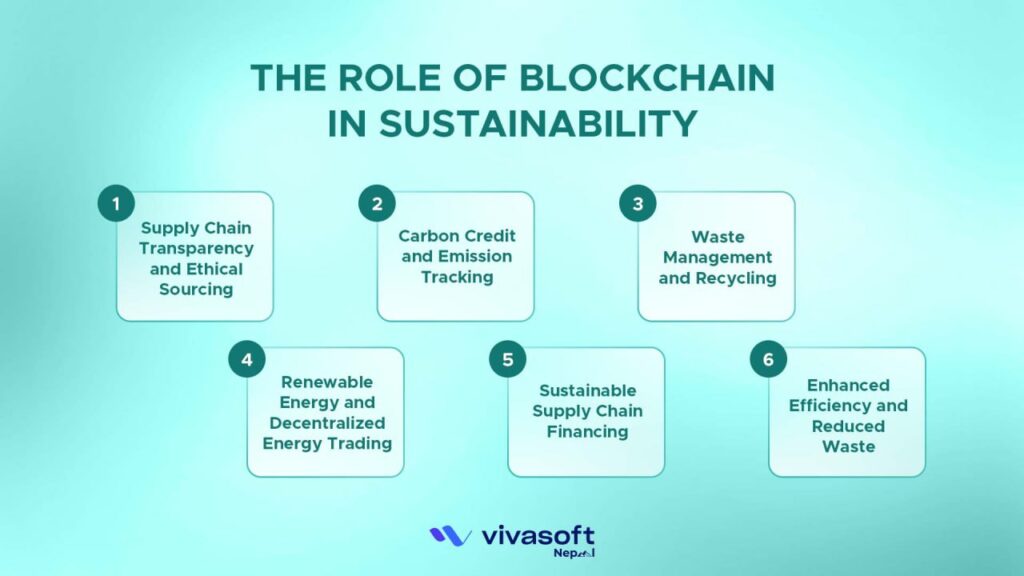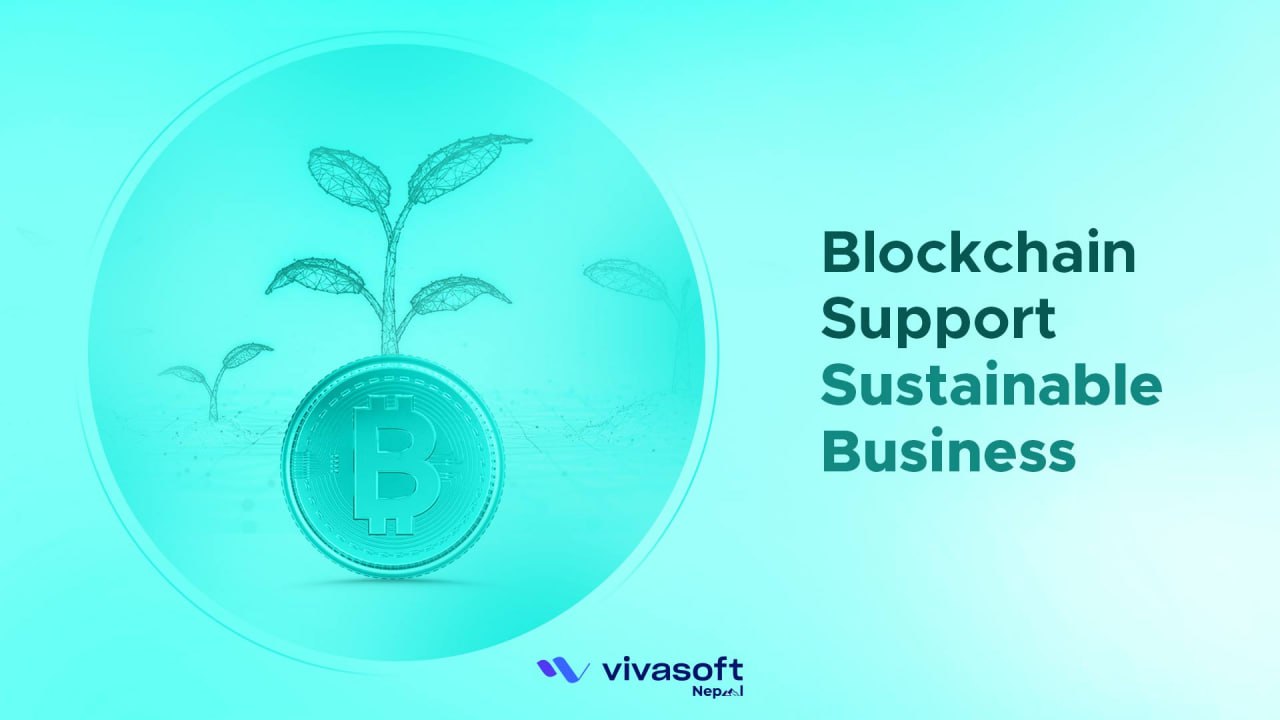Unregulated and unverified products are the reason for nearly 26% of global greenhouse gas emissions, and use half of the world’s habitable land for agriculture. To prevent damage to the climate, water, and wildlife, blockchain can be used to support sustainable business practices.
Through the decentralized ledger system, you get a clear and trustworthy proof of a product’s environmental footprint. Businesses can track carbon emissions, verify ethical sourcing, and reduce waste with tamper-proof records. It improves sustainability, streamlines operations, and cuts costs through the smart contract.
What Is Blockchain Technology in Sustainability?
Blockchain is the digital technology that keeps a record of transactions of the connected blocks. You can think of it as a secure, shared ledger.
It is a reliable ledger that tracks the transaction and makes things easier for the user to verify and use. In terms of sustainability, blockchain technology brings a new level of privacy and enhanced trust. You can trace a product’s journey from its source to your hands. You can check on yourself if the company is properly following ethical and green practices.
For example, a clothing brand sources its cotton from certified organic farms or a coffee company uses fair trade beans. The blockchain system saves the data from tampering and keeps it intact. The best part is, it works without a central authority, and you can access the same trustworthy information at any time.
When Blockchain and Sustainability Come Together?
Blockchain and sustainability can act as joint forces if you want to build a trustworthy and robust system. These are the key areas where blockchain impacts sustainability:

Supply Chain Transparency and Ethical Sourcing
Blockchain technology provides end-to-end visibility across the entire supply chain. This includes product sources, manufacturing, to delivery. With clear information about the farm, factory, and port, you can build trust with the company. Besides, it gives you confirmation whether they follow ethical labor, fair trade practices, and ensure essential compliance.
Carbon Credit and Emission Tracking
Blockchain records carbon emissions accurately. You can prevent false claims and duplicate credits. Blocks record each emission or offset event with clear ownership details. You can track how credit was generated, whether from planting trees, solar projects, or other verified processes.
Waste Management and Recycling
Managing waste is now far beyond collection with blockchain. The tech helps you track every stage, such as pickup, transport, sorting, recycling, or disposal. You can also verify where the waste is recycled or reused. Some systems reward you with tokens for recycling properly, and improve the recycling rates.
Renewable Energy and Decentralized Energy Trading
Traditional energy markets are complex and centralized, but blockchain offers decentralization where you can directly trade energy with neighbors, businesses, or community grids. The absence of smart contracts manages pricing and volume instantly. You will find each trade recorded without intermediaries. It helps build cleaner grids and earn from your excess power.
Sustainable Supply Chain Financing
Blockchain links funding to a sustainable process. Investors and lenders can verify the data from your water usage, emissions, or material sourcing. It reduces risk and speeds up the financing process. And if you are running a business with full compliance, smart contracts trigger payments or lower interest rates.
Enhanced Efficiency and Reduced Waste
Through the smart contract on the blockchain, companies can now automate tasks like payments and shipments when conditions are met. It prevents human interruption and possible errors. By reducing paperwork and delays, you can ensure almost less to no errors and save time. This efficiency lowers waste in production and logistics.
Benefits of Using Blockchain for Sustainability
Blockchain offers real advantages for sustainability. It improves the trust level and efficiency of eco-friendly practices. Moreover, you can expect:
- Increased Transparency and Trust: Blockchain records every transaction permanently and is visible to everyone connected. You can verify claims about sustainable sourcing and anything about carbon offsets. It reduces supply chain fraud by up to 20%.
- Improved Energy Efficiency: Decentralized ecosystems reduce energy costs by about 15%. You can trade renewable energy directly with others and eliminate the wattage.
- Lower Costs and Higher Efficiency: Smart contracts automate systems and compliance tasks. Even by reducing paperwork and errors, it helps cut overhead costs.
- Positive Impact on Corporate ESG Performance: Studies show that companies using blockchain improve their environmental, social, and governance sourcing by up to 45%. Firms focused on ESG see even unexpected benefits.
- Reduced Fraud and Corruption: Blockchain reduces the risk of data manipulation. With every transaction recorded across multiple nodes, there is no chance of fraudulent claims.
- Streamlined Waste Management: Blockchain ensures that every stage of product disposal is traceable. It helps to confirm whether items reach recycling centers and are not illegally dumped. This improves efficiency and supports circular economies.
Challenges of Using Blockchain in Sustainability
Blockchain offers a great opportunity to maintain sustainability, but it is not free of obstacles. You may need to consider:
- High Energy Consumption: Many blockchains, especially with the Proof-of-Work, consume huge energy amounts. For example, Bitcoin’s energy use is comparable to the energy consumption of entire small countries. As a solution, consider Proof-of-Stake to reduce this footprint.
- Scalability Issues: With the flow of transaction validation, blockchain often faces scalability hurdles. Thus, often it results in delays and higher costs. All you need to do is perform frequent system updates to maintain the demand.
- Regulatory and Legal Uncertainty: The lack of clear laws and regulations about this technology often creates legal issues. You may face legal risks or compliance issues, especially if you’re operating across borders.
- Integration with Existing Systems: Integrating blockchain technology with current business systems, supply chains, or regulatory frameworks, is challenging enough. Companies need to manage staff, and train them for better management.
- Interoperability Challenges: Different blockchain platforms often cannot communicate easily. Such a fragment often stops the seamless data sharing between networks.
Use Cases of Blockchain in Sustainable Business
Get the list of some major use cases showing how enterprise blockchain solutions support sustainable business practices:
- Food Safety and Quality Assurance: Walmart and Nestlé use blockchain to track food origins and quality. They can verify ingredients and production details instantly.
- Carbon Credit Trading: Platforms such as Toucan Protocol tokenize carbon credits on a blockchain. It helps build a fraud-free market for carbon offsets and records companies to reduce emissions.
- Anti-counterfeiting and Product Authenticity: Chronicled utilizes blockchain to verify product authenticity and identify counterfeit goods. Thus, customers can get only genuine sustainable products.
- Decentralized Insurance: Blockchain offers peer-to-peer insurance models that reduce intermediary risk. You can witness reduced fraud in insurance claims.
- Ethical Labor and Fair Wages Tracking: Blockchain tracks the labor conditions of workers along with the supply chain. It confirms that employees get fair wages and work in safe conditions.
Future Adoption of Blockchain Sustainability
You can expect the rapid expansion of the blockchain ecosystem to ensure sustainability. This is possible through the growing decentralized technologies, advanced smart contracts, and powerful tokenization.
With businesses seeking more reliable, immutable data, only blockchain can offer real-time tracking of supply chain processes through distributed ledgers and reduce fraud. The integration with the IoT (Internet of Things) will enhance the blockchain offering to monitor environmental data.
You will find more companies linking blockchain to carbon markets to reduce emissions more efficiently. Blockchain will also expand in waste management. It will increasingly reward recycling and reduce landfills. Even financing the green projects through blockchain will attract more investors who are seeking verified impact.
Conclusion
Blockchain is transforming sustainable business with improved transparency across different areas. This includes supply chains, energy, and finance. It tracks products from source to consumer, verifies carbon credits, and supports renewable energy trading.
All in all, it reduces fraud, lowers emissions, and promotes ethical practices. So, if you haven’t started using these advances, now is the time to adopt blockchain for sustainability. Take action today and build a greener, more transparent future with blockchain.
FAQs
How do blockchain and AI help track products in sustainable supply chains?
Blockchain builds a secure record of every product’s journey, where you can track everything from origin to delivery. AI analyzes this blockchain data in real time, identifies risks and inefficiencies.
Which benefit can blockchain technology offer to help organizations with their sustainability efforts?
Blockchain offers organizations a tamper-proof way to track sustainable practices. It verifies eco-friendly sourcing and monitors carbon emissions.
Is blockchain able to enhance environmental sustainability?
Yes, blockchain enhances environmental sustainability through a decentralized system. It offers more renewable energy trading and carbon credit verification, enhancing green practices.
Why are energy-efficient consensus mechanisms crucial for sustainable blockchain use?
Energy-efficient consensus mechanisms like Proof of Stake can save their energy use by 99.98%. They lower resource consumption, improve security, and speed up transactions in a cost-effective way.







